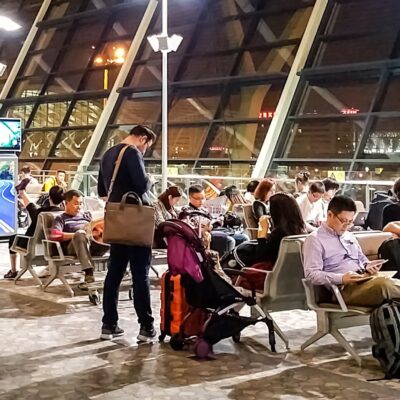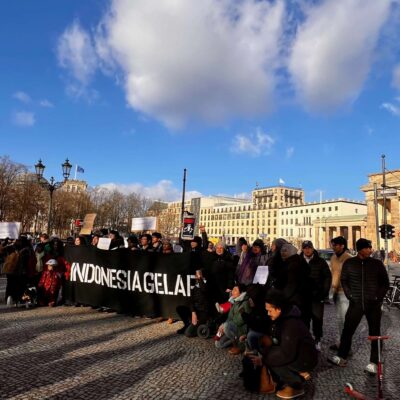Thailand’s monarchy and military exert a huge influence on government.
Since the nation was declared a constitutional monarchy in 1932, there have been 12 coups (and more attempted), the most recent in 2014.
Democratic advocacy organisation, Freedom House, currently rates Thailand as ‘partly free’, giving it credit for holding competitive parliamentary elections in May last year. But the result of the elections has demonstrated the continuing strong influence of the military and royalist forces.
The reformist Move Forward party won the most seats in the House of Representatives and looked to be able to form a majority through a multi-party coalition.
But the Party’s leader Pita Limjaroenrat has been blocked from becoming Prime Minister and the Move Forward party may be dissolved by authorities.
The Harvard-educated businessperson is also facing being banned from public office for 10 years over his party’s intention to reform the lèse-majesté law which prohibits criticism of the monarchy.
Mr Limjaroenrat spoke with Melbourne Asia Review’s managing editor, Cathy Harper ahead of delivering the University of Melbourne’s inaugural Southeast Asia Oration.
What are your plans for the future of your party?
To move forward! Either under the same brand name, same political party, same colour, or in a different political vehicle under a different name, but the ideology and the platform will continue. It’s a tragedy that we’re talking about this, the second time in five years and five times in 20 years. I’m trying to the best of my ability not to have this vicious cycle going forward. For me and for my party and my MPs and a lot of our supporters, whether it’s inside Thailand or observers from afar such as diplomats from various countries, are thinking of this as a way to save the democratic space in Thailand to make sure that the boundaries between executive, legislative and judiciary are balanced. It’s quite easy to slap some cases against political parties or political leaders who are elected. A lot of ‘independent’ organisations that have been used to slow down the pace of change have no accountability to anyone. Independent of whom, independent of what? It might be independent of the people but very dependent on a certain elite or certain individuals and we don’t want that to be the case Thailand.
Do you think the courts are being used by the military as a way to control the government, kind of a soft coup almost?
I hope not. I hope that voices from within Thailand and outside Thailand are strong enough that this is not going to be the case any longer. It doesn’t have to be a military coup and tanks on the streets of Bangkok, it can be lawfare and not warfare.
Do you think that former Prime Minister Thaksin Shinawatra is actually a kind of de facto Prime Minister, calling the shots behind the scenes?
I would say it’s not behind the scenes. I feel like the visibility of Prime Minister Thaksin is equivalent, if not more, than the current Prime Minister himself. We do a lot of data analysis, we do a lot of social listening tools and we see that the frequency or the velocity or the size of the appearance of Prime Minister Thaksin is equivalent, if not more, than the current Prime Minister. And lot of interviews that were given contradicted the current Prime Minister. It’s understandable why the media or the people are starting to question the leadership of the current government, who really runs the government and if there is two tigers in one cave then what happens? To prove my point is the situation in Myanmar, or the situation of the conflict down south with the border of Malaysia. Former Prime Minister Thaksin admitted himself that he is trying to broker a peace deal, which is OK, but for what accountability or for what authority does he have to do that? If he does a good job then that’s OK. But if he doesn’t do a good job then he mediates for his personal businesses, for example, then there’s no linkage. But the current Prime Minister has a duty to report to the parliament, which is the check and balance.
How do you see the alliance between the Pheu Thai party and the military being sustained?
A flip flop alliance. There is a reason we have a lot of debates on the TV. The people of Thailand deserve to know who you will form a coalition with for example. We said ‘we don’t want the military dictator to be part of our coalition’. Pheu Thai also said the same in a debate but they u-turned and they formed an alliance with the military. That’s in the past, I know, it’s been almost a year. But what remains today is how they entered power. For example, you want to end military conscription and use the military budget for something else such as climate change. But because the way you entered power was by u-turning and destroying your legitimacy and you formed government with the military who ousted you and who staged two coups against you, you [cannot] exercise the policies that you promised the voters. You couldn’t do it because the military is part of your government. So, how you got to power and how you exercise power, there is still a linkage one year after. It’s not just me being glum or being really bitter about the past year. It effects Thailand today and it will affect Pheu Thai and the military going forward as well.
What do you want to do in the short term and medium term in terms of Move Forward’s plans, including economic reform?
I think in the short term, we are the largest opposition, the duty for us is to pass progressive laws, provide checks and balance to the government and speak on behalf of the people. On economic reform we feel like the Small and Medium Enterprises (SMEs) have been neglected very much. We feel that the cost of living is way too high and the majority of that comes from energy prices which is from monopolisation of electricity generation. The third thing is not just about the economy, but in terms of environment and education – these are two things that impact the economy. It could be an opportunity for economic growth or it could be liability for economic growth, compared to Malaysia, Indonesia, Vietnam in terms of manpower. We really need to start now because we are losing competitiveness in this kind of situation.
How can these plans be realised with the history of political coups and the current political turmoil going on since the election? How can you get things done?
We have to set the political institutions straight first. In our campaign everyone was just talking about the economy. It was us who talked about politics and economy as well. We have various political policies hoping to end the cycle of military coups, such as a civilian government, making Thailand part of the International Criminal Court so there is international scrutiny when it comes to these things, putting in the Constitution the inability to grant amnesty by the military to themselves, so nobody can prosecute them. People cannot accept the normalisation of coups. It’s happened 12-13 times since 1932 and they feel like if there’s going to be violence on the streets they might as well just let the military come in; at least they are not going to be corrupted like politicians and things like that. But in the past 10 years it has been proven again and again that the corruption index is going downhill even if there is the military. For someone who is trying to ride a bicycle of democracy, it’s not always going to be a straight line. There may be zig zags and you will probably fall a couple of times, but you are going to let the institution find a solution rather than having the military kick you off the bike and they take the driver’s seat.
The result of the election last year shows that a reformist agenda is attractive for a lot of people. How do you reconcile your reformist plans with the reality of having to form power? Do you think you got that equation right? Did you take a too ‘purist’ approach?
We tried to reform with confidence and the result speaks for itself. We’re not trying to change Thailand to something that is beyond their imagination. I planned short, medium and long term. We said what we wanted to do in the first 100 days, the first term and the second term. A lot of things that might seem very radical to a lot of people we said very clearly, very precisely, very objectively, that is not going to be done in the first year or two. These kinds of things are hard to digest for people and obviously a lot of fake news operations and information operations by the military themselves or by some other people. But if you change too slowly that means other people are going to change it for you, such that foreign direct investment will just go to Vietnam, Malaysia, Indonesia and force us to change.
We’ve talked in general terms about some of the obstacles that Thailand is facing in terms of reform and a more democratic future. But can you pinpoint some of the immediate issues that could be changed fairly quickly.
Politically, a new Constitution. The Constitution was drafted by the military after the military coup so that has to be changed very quickly. If the parliament agrees and there’s no politicking, we should definitely start on a referendum. In terms of the economy, we can demonopolise a lot of industries, the power industry, the liquor industry. We use a lot of examples in Australia after the legalisation of craft beer and liquor that could be commoditised. Agriculture businesses that will actually jump-start the economy fairly quickly. In terms of decentralisation we can also start a referendum on that so that Bangkok is not Thailand and Thailand is not Bangkok. In terms of bureaucracy – regulatory guillotine. We did a study about four years ago in the past parliamentary cycle and half of [the bureaucracy] can be put on pause. That reduces the corruption right away because corruption is discretion and lack of transparency.
What do you see of the chances of those things actually happening?
I had a 312 coalition government – 312 out of 500 [seats]. That is quite a safe majority, a comfortable majority at least. But it didn’t go as planned. The number two party turned away and formed a coalition with their former nemesis. That’s why we couldn’t deliver and we became the opposition. But at the next election, in order to materialise what we promised, the voters have to work together with us and give us that political weight that we become the undisputed leader in democratic Thailand. We’re talking about 100 more districts and the way we realise that potential is to use a lot of data to see the 100 districts that we lost by a five percent margin. I know exactly which areas that we almost came first, we almost had that number. If we get 100 more we become 250 [seats]. One party in government is a possibility. We don’t want to be accused of [being] a dictator in the parliament just because we have one party, but we also want to go beyond 250 to have a buffer, maybe 270-300 seats. But winning elections alone is not enough. Former Prime Minister Thaksin had 370-something seats, maybe 17-18 years ago, but a lot of his ideas couldn’t transform into anything. It’s not just the quantitative side of politics but also the qualitative side of politics, which is making sure that you have that authority, but you also have that legitimacy as well to deliver change. An example is the passing of marriage equality. The sun is going to rise tomorrow and for a lot of people it will be a new world for them. For the people who opposed it because of religion or other things, your mortgage is not going to go up just because love is love right here in Thailand, for example. But it took 35 years in the making. Society advances and the parliament had to follow and finally even the most conservative MPs I know voted for marriage equality. If the ideas outside are so strong and valid and people say ‘OK this is this is way Thailand should be’.
What time frame do you have in your own mind about your own political future and Move Forward or whatever iteration it might be in the future?
I plan for my life in 10 years, in a decade. I started following politics in my pre-teens, I want to say 12, 13, 14 in that range. In Hamilton, New Zealand. Jim Bolger was the Prime Minister. You had three television stations back then: cricket, rugby and Home and Away and the parliamentary debate on television. From 40 until 50 years old that’s the timeframe that I plan to be in politics and then I want to go do something else. I want to be in international organisations, United Nations. I feel like I’m relevant now, 40-50 then I can pick up what’s going on around the world. Once I’m older than this and the world is moving faster than this as well, it’s my job to pass the baton. And I feel like within 10 years I can leave a dent in the universe and let the upcoming politicians come up, but I definitely want to create change that I can do within these 10 years.
I wonder if you could reflect on the state of democracy in Southeast Asia which has been in decline in many nations over recent decades?
It’s backsliding and fragmented. It’s not perfect in any country, but some are flourishing and some are not. In Cambodia you have the demolition of the Candlelight Party. In Myanmar you have the risk of not being able to imagine what the post-conflict Myanmar would look like. A lot of people have different visions for what Myanmar should look like after the conflict while the violence dynamic is still going on. People still don’t really have the time to reduce the risk of balkanisation. In Thailand it is, as you said, a judicial soft-coup and an attack on democracy. Indonesia, the Philippines also, there is a question about political dynasties and things like that. But I feel like it’s really important for the ASEAN communities and us to really stick together in terms of solidarity because there is a slippery slope that once something happens to one country it impacts another. Not just [because of] political linkages but also economic linkages as well.
What do you think of the view that is quite often expressed, but is perhaps a cliché, that Asian publics like strong leaders? Do you think that’s true?
I think it’s true all around the world. I just came back from Berlin and that’s also the case. I guess it’s because of the rhetoric that is going on around the world – two wars as well as the pandemic that we went through as well as stagnant economic growth. The progressives, including myself, have to be much smarter and much stronger and also show the people that leadership is not just about fear. It can be about hope and it can be about working together with the people and it can be about empathy, for example. My favourite leader in the world who I look up to is Jacinda Ardern. I think she proved to the world during the Covid crisis and during the Christchurch massacre that you don’t have to be a ‘strongman’ with fear tactics and a militant background to resolve crises for the country. We progressives have to be smarter and stick together and make sure the world doesn’t turn any more ‘right’ than it is, especially this year when there are a lot of elections going on.
This interview has been edited for clarity and length. It is part of an Asia Institute and Asialink series on democracy in Southeast Asia. It was recorded ahead of the inaugural Southeast Asia Oration at the University, to be delivered on 4 July by Mr Pita Limjaroenrat MP, a Member of the Thai House of Representatives and Former Leader of the Move Forward Party.
Main image: Pita Limjaroenrat/Facebook/Prachatai/Flickr.
Listing image: Pita Limjaroenrat, May 2023. Credit: Getty Images/NurPhoto/Contributor




